Choosing the perfect countertop material for your home isn't always easy. For example, are you torn between installing Formica or melamine countertops in your space but don't know which is better? What are the differences between these two materials? Are they the same thing?
Luckily, we've done plenty of research and have the answers below!
Between Formica and melamine, you're more likely to have long-lasting durability with Formica countertops. That's because Formica is fused at high pressure, while melamine is fused using low pressure.
Not only does that make Formica more durable, but it also has higher quality. However, Formica countertops are more expensive than melamine, which can be a drawback.
As we begin this article, we will cover all things Formica and melamine countertops and discuss which is best and their differences. Whether you're renovating, starting from scratch, or need additional help, we're here for you. With that said, let's dive right into this topic!
Formica Vs. Melamine Countertops
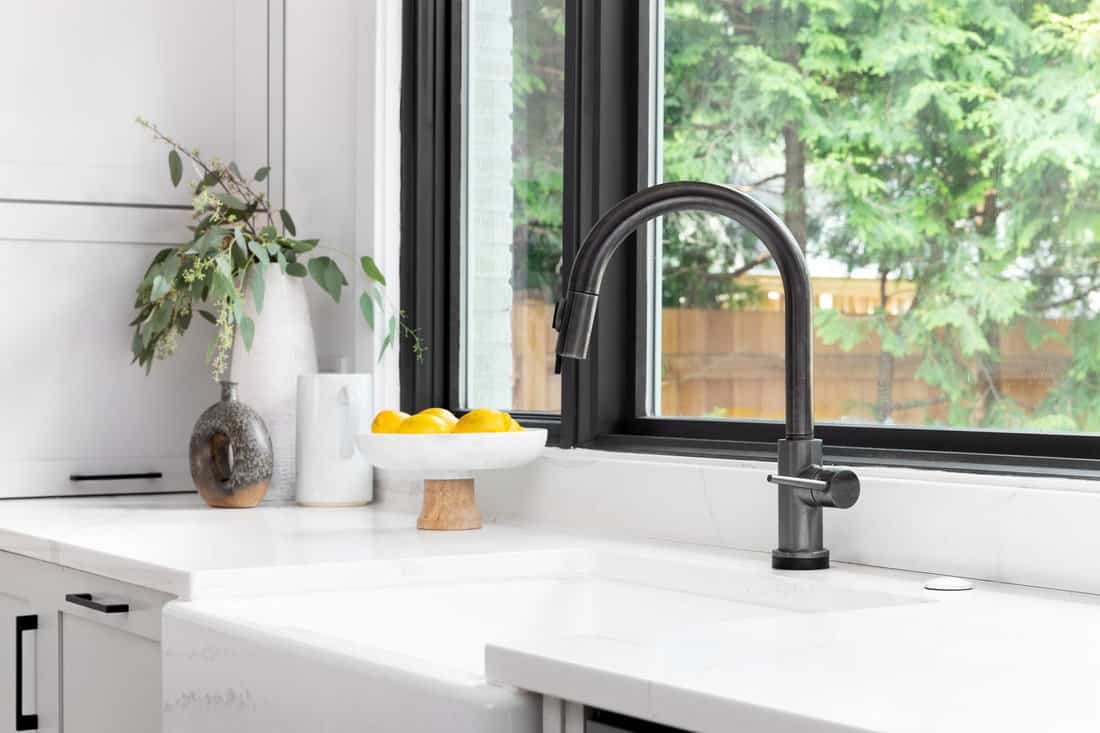
Before you choose a countertop/surface material for your house, it's essential to know how they're made. One of the biggest differences between Formica and melamine is how much pressure is used to fuse them.
Generally, you can expect Formica to be a high-pressure laminate (HPL) made with over 1400 pounds per square inch of pressure.
In contrast, melamine is considered a low-pressure laminate (LPL) fused with 300-500 pounds per square inch. That essentially makes Formica the stronger, more durable material between them.
One thing to note is that both Formica and melamine are laminate materials. Therefore, they're synthetic countertops, which is why they are relatively cost-effective.
According to Angi, laminate countertops are one of the most affordable options, making Formica and melamine great options for those on tighter budgets.
We recommend Formica because of its better durability and resilience to wear and tear, so that's something to keep in mind.
Are Melamine And Formica The Same Thing?
Although melamine and Formica are close, these two materials are not the same. As we said before, Formica and melamine counters fall into a laminate category.
Laminate counters are created using a mix of plastic fused with kraft paper or particleboard. This makes them synthetic, often perfect for office spaces and other low-stress environments.
Since Formica and melamine are both artificial, they aren't always ideal for heavy-use kitchens or home spaces. Of course, this depends on the brand and quality of your material, so that's not to say either won't be great for your project.
Moreover, you will more often see melamine used for shelving, office furniture, whiteboards, and even flooring. In contrast, Formica is more appropriate for countertops because of how it's made.
Between these materials, Formica will always be stronger. Therefore, if you need a countertop material for the kitchen or bathroom, Formica is what you want to choose.
Melamine isn't strong enough to withstand everyday wear and tear and isn't ideal for high-volume spaces. So, although these two materials are laminate, they are very different in quality.
What Are The Pros And Cons Of Formica?
We sometimes add affiliate links and content that was curated and created by our team with the help of advanced ai tools to help showcase the best design styles.
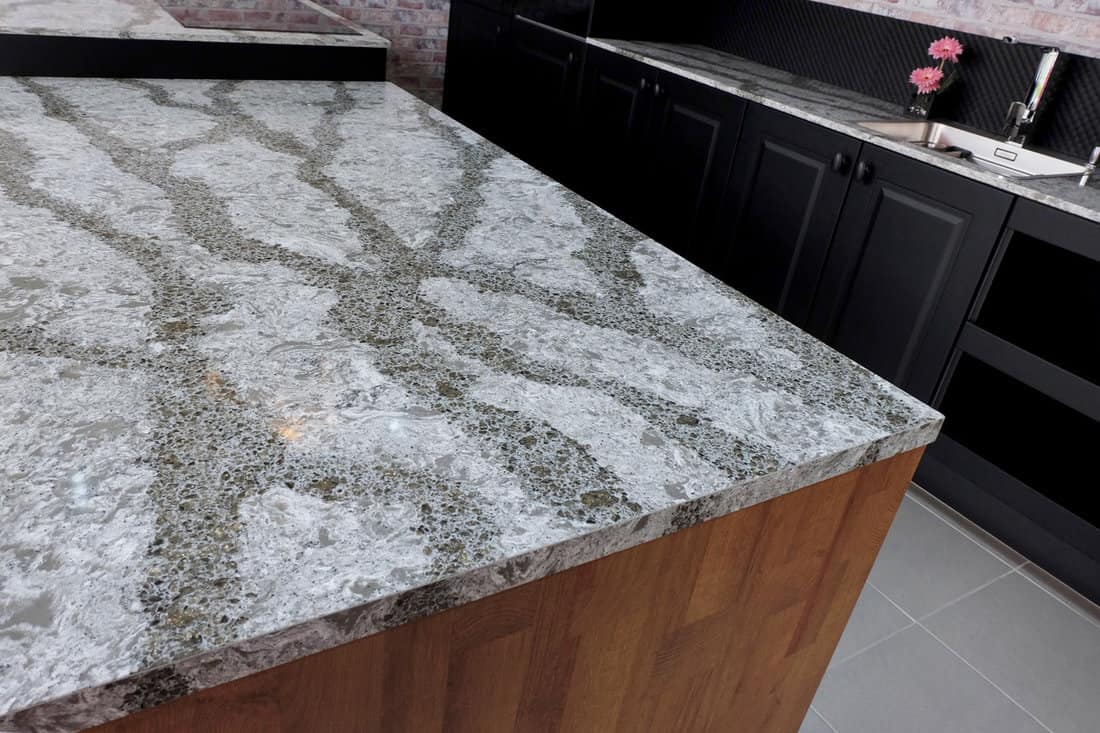
Before deciding on Formica, it's always good to know its pros and cons. Luckily, we've put together a list of both, which should help you understand this laminate material better.
Pros:
- Newer Formica has a visually appealing design.
- Formica is very easy to clean and maintain.
- This material lasts a long time and can withstand everyday use.
- You can remodel using Formica for a low cost.
- Formica doesn't require specialty polishes and cleaners.
Now, with the pros in mind, let's discuss the cons of using Formica.
Cons:
- Formica is not as durable compared to stone/natural materials.
- Laminate counters tend to look cheap.
- Formica can burn in extreme heat and warp.
- This material doesn't add resale value to a home.
- Won't last as long as naturally made/derived counters.
So, you can see the pros and cons that may cancel each other out depending on what you're after. One major consideration for Formica is that it doesn't look high-end or expensive.
It's easy to tell when a surface is Formica, which might be a turn-off to potential home buyers. In addition, unlike stone countertop materials, Formica (although more durable than melamine) still can't hold up against damage.
Again, we recommend Formica between the two, although that might not be enough reason to install them. If possible, choosing a fancier stone material might be a better long-term investment.
What Are The Pros And Cons Of Melamine?
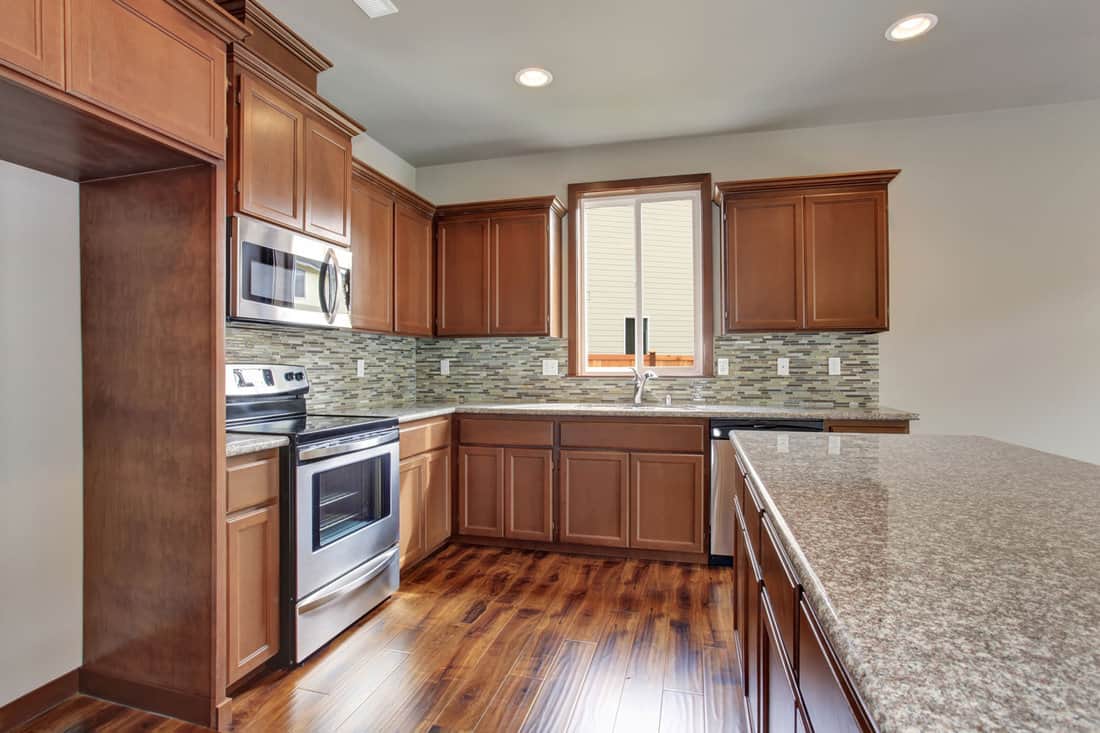
If you want to install melamine counters or use them for another surface in your home, it's crucial to weigh the benefits and drawbacks. Let's get into both below.
Pros:
- Melamine is very cheap to install.
- You don't need to use specialty cleaners.
- This material is lightweight, making it easy to install.
- Melamine should hold up nicely in low-volume spaces.
Now, with the pros in mind, let's also discuss some of the cons of using this material.
Cons:
- Melamine is easy to damage and won't last long.
- Laminate countertops have zero resale value.
- Your counters will chip, stain, and scratch faster.
- Melamine can look very cheap, depending on the brand/color.
Looking at this list, it seems the cons outweigh the pros. Even though installing melamine will be easy and cost-effective, having them in your home may not be worth it.
Like Formica, melamine also adds zero resale value to a property. Therefore, installing it into your space is essentially wasting your money in the long-term scheme of things.
As we said, it might be better to utilize melamine in other ways, like cabinets or even office desks. This material can be considered cheap and tacky for the home, so we don't recommend it.
How Much Does It Cost To Install Formica Countertops?
You can usually expect Formica counters to cost $31 per linear foot to install. Considering that many countertop materials can cost 75$+ for installation, this seems like a pretty good deal.
According to How Much, the labor for a Formica install should also set you back between $30-$40 per hour. Most homeowners spend around $1,230-$1,300 for their entire Formica installation.
Considering that your countertops may cost $1,500-$3,000 for just the material if you choose stone, Formica does sound like a good money-saving choice.
However, with its lower price comes a short lifespan. You might be able to get new counters for under $1,500, but in the next ten or so years, you'll likely need to replace them.
This is a perfect example of spending less and getting less. Sometimes, if a deal is too good to be true, that's because it is. Laminate counters are fine for a home but aren't the best long-term material.
How Much Does It Cost To Install Melamine?
If you want to install melamine countertops into your space, this will follow a similar price range to Formica. Generally, melamine costs around $25-30 per linear square foot.
From there, your labor shouldn't be too pricey because of how light and easy melamine is to work with. In total, you might get away with spending $790-$1,628, which certainly seems enticing.
As we mentioned, melamine and other laminate materials are cheap to install and buy. However, with that, better pricing does come drawbacks.
Like Formica, your melamine counter may only last ten or so years before needing replacement. Additionally, if you use melamine countertops often, that will shorten their lifespan significantly.
Laminate materials aren't always best for high-volume areas, which can become a problem in your bathroom or kitchen. A good place for this material would be a laundry room, or somewhere your counters won't take a beating.
Are Laminate Countertops Good?
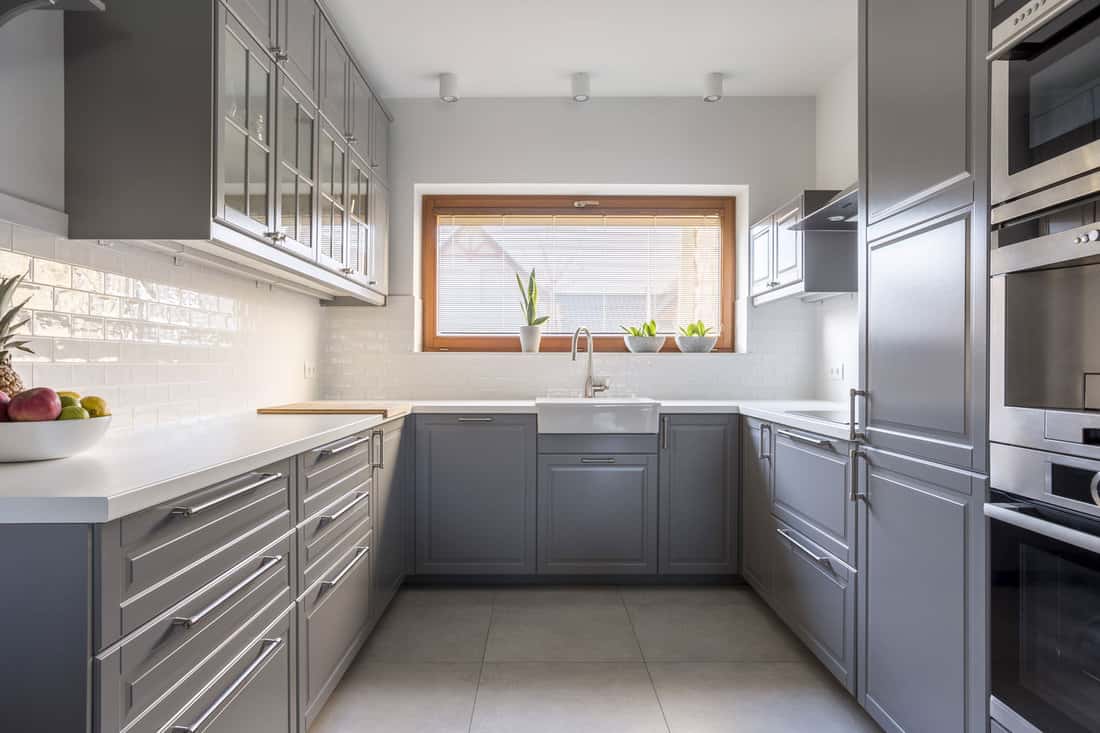
If you're on the fence about installing laminate countertops in your home, this material has pros and cons. As we shared, Formica and melamine are commonly used for home construction, although they aren't generally used for kitchens and bathrooms in modern properties.
Laminate used to be very popular in the early days, as it was cheap to make and install. People who couldn't afford marble or granite countertops opted for laminate, ultimately making it a top choice for budget building.
However, as the years progressed and stone counters became more accessible to everyone, laminate fell out of style. According to a study done by Forbes, laminate surfaces tend to scratch, stain, and warp much faster than other materials.
That can become a major issue if you have a laminate material in the kitchen. Unlike quartz or granite, laminate is made using plastic and synthetic materials.
In high heat, this can cause the laminate to become damaged and irreparable. So, again, even though these countertops are cheap upfront, you'll spend much more over time replacing them.
How Long Do Laminate Countertops Generally Last?
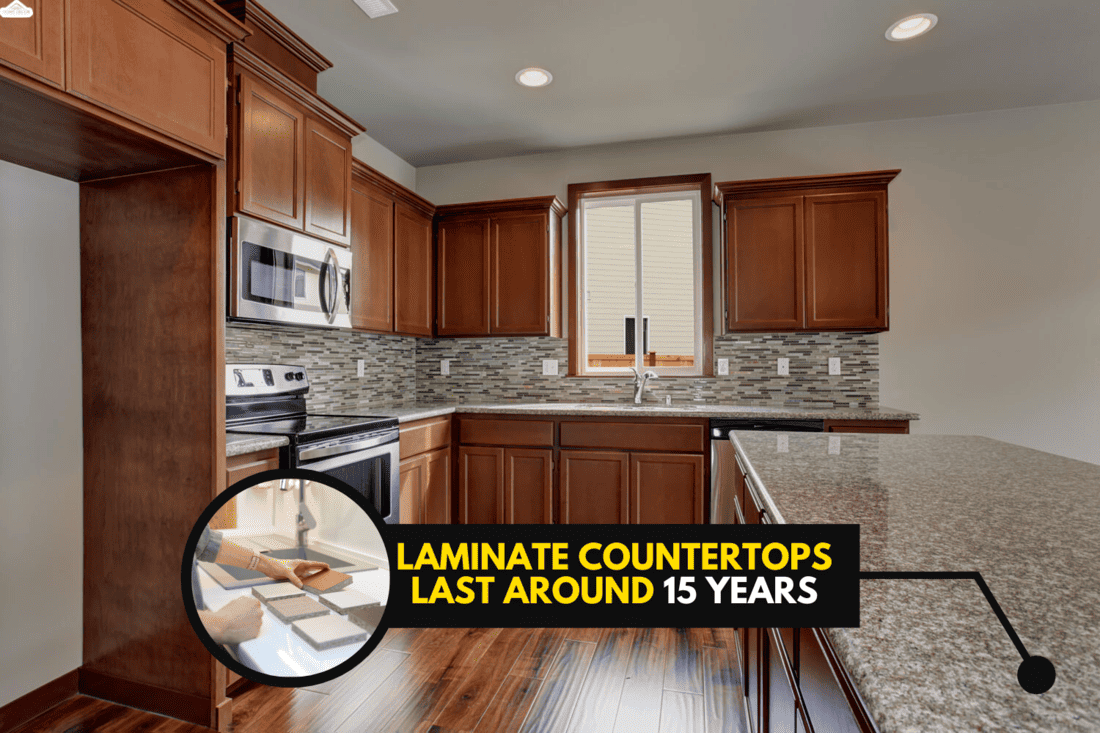
With regular use, you should see laminate countertops last around 15 years. However, we would bet on ten if you have cheaper melamine laminate countertops.
Remember, between melamine and Formica; the Formica will last better over the years. That's thanks to how it's made in high pressure versus low pressure for melamine.
Furthermore, your laminate countertops will age better if you take good care of them. For example, we recommend keeping hot cookware off laminate and not slamming things around it.
The material might stay attractive for over a decade if you're cautious enough.
To Finish Up
Whether it's time for new countertops or you're curious about Formica and melamine materials, it's always good to understand their differences.
We found that although these two materials are laminates, Formica is much stronger and lasts longer. In contrast, melamine is made using low pressure, causing it to age faster than Formica products.
We recommend Formica over melamine if you want to use laminate for your countertops.
And while we have your attention, check out these helpful related home posts below:
How To Paint Laminate Bathroom Cabinets In 8 Simple Steps
Can You Use A Bissell Crosswave On Vinyl Or Laminate Flooring?
